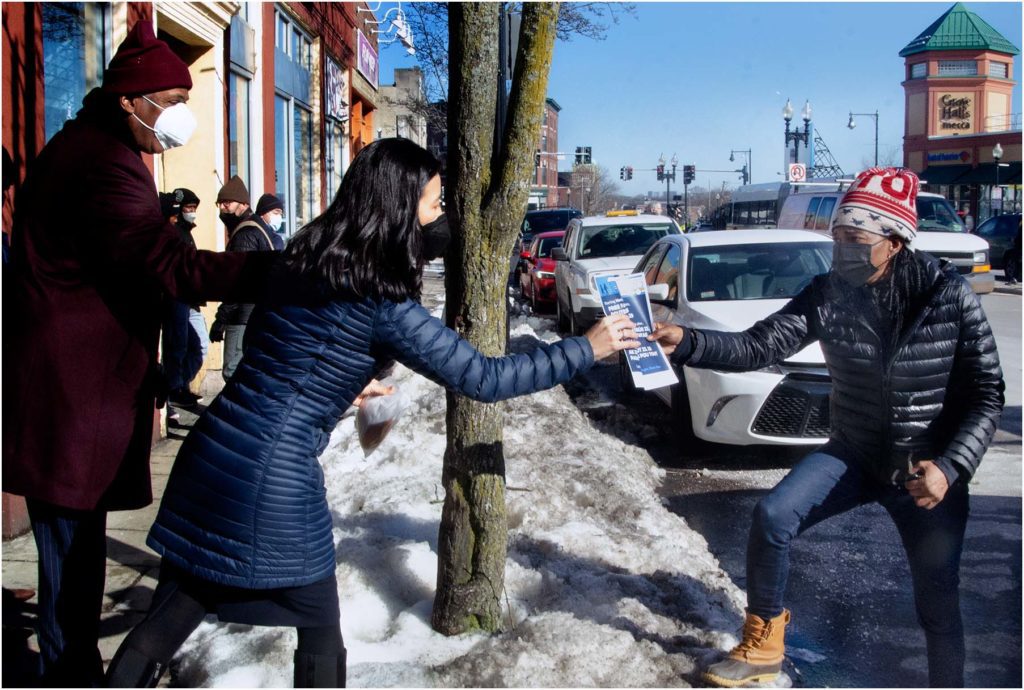City, MBTA to expand free bus program
The 23, 28 and 29 buses to be included in a two-year pilot

Starting in March, riders on the 23 and 29 bus routes will be excused from paying fares as part of a two-year pilot program announced last week by Mayor Michelle Wu. The 28 bus, which is already operating fare-free, also will be part of the two-year pilot.
In an address to the press on Feb. 9, the mayor laid out plans for the fare-free ridership on the three lines that run through Dorchester, Mattapan and Roxbury and serve majority people of color. The 23 route runs from Ashmont to Dorchester Center, Grove Hall, Ruggles and Nubian Square; the 28 route from Mattapan Square up Blue Hill Ave. to Ruggles and Nubian Square; and the 29 route from Mattapan Square up Blue Hill Ave. to Jackson Square.
Wu spoke about her decisions to choose these three routes, and how eliminating fares on bus lines will help make Blue Hill Avenue into a “transformational economic corridor.”
“[Fare-free transit] is the single fastest way that we can achieve our goals,” she said. “From equity and economic mobility to our climate justice goals to our public health goals of reducing asthma and reducing exposure to pollution in our neighborhoods, easing traffic and congestion,” Wu said.
According to TransitMatters and other groups that have been advocating on behalf of transit riders across Massachusetts, fare eliminations shorten journey times and increase frequency of service, improving life for low-income residents who frequent public transportation.
One resident who relies on bus service is Peggy James, a Mattapan resident who shared her testimony during the Mayor’s press conference. She told reporters she takes the bus up to six days a week, multiple times a day.
“It gives me the opportunity to do my groceries, my laundry, my gym activity, which is my therapy for my disability, it is so important,” she said. “Everything is here that I do.”
James expressed her gratitude to those that made the program possible.
“It’s just a gift that keeps giving,” she said.
Standing outside at Grove Hall Plaza in Dorchester, Wu was accompanied by several city officials, including Chief of Streets Jascha Franklin-Hodge and MBTA General Manager Steve Poftak. Together they shared enthusiasm as well as the challenges ahead.
“Today’’s announcement is really exciting,” Franklin-Hodge said in a statement. “We plan to use these two years to learn how making transit free can affect peoples’ travel decisions, improve the performance of the bus itself, and bring additional benefits to riders and the communities along these routes.”
One of the main challenges, according to Poftak, will be finding funding sources to continue the work if the pilot is successful.
“There are some larger structural questions that I know that the mayor has been deeply involved in,” Poftak said.
The pilot is currently funded by $8 million in federal COVID-19 recovery funds — a finite resource available to the city. The funds will reimburse the MBTA for the lost fares from the program’s ridership.
Data suggests the pilot has a high chance of achieving its strategic goals. According to data from a smaller fare-free pilot for the route 28 bus that started under former acting Mayor Kim Janey, both ridership and route efficiency have increased.
According to a statement from the mayor’s office, after fares were eliminated in August 2021, Route 28 saw ridership increase to over 90% of pre-pandemic levels, with more than 12,000 riders every day, compared to just 60% across the rest of the MBTA bus system.
In order to measure the efficacy of the pilot, Wu said, the city will continue to make progress reports routinely throughout the two-year period. Prompted by a question from a reporter, Wu said the timeline of the project will be crucial in gathering useful data. The project was originally slated to begin earlier this year but was delayed by Federal Transit Administration regulations attempting to limit the pilot duration to six months.
“It will take time — one, for residents to know what’s happening and to be able to build this into their daily lives; two, for businesses to make decisions; and three, for us to really see the impact of that across multiple seasons and multiple years. So it was really important that we could have that longer time frame,” she said.
Boston isn’t alone in working to eliminate fares — cities like Cambridge, Lawrence and Worcester all have taken steps to look into fare-free transportation. Last month, the Boston Globe reported that 15 municipalities have sent a letter to Poftak’s office asking the MBTA for help in creating their own fare-free programs.
Ending her visit for the day, Wu distributed flyers to businesses around Grove Hall, informing residents and business owners about the program, which is set to officially start March 1.
In a final statement she said, “I’m thrilled to partner with the MBTA to expand this successful ongoing program and look forward to working with our partners across the Commonwealth to build a sustainable, reliable, accessible and affordable transportation system that truly serves our residents and our local economy.”
For more information on the fare-free bus program, residents can visit www.boston.gov/free-bus






